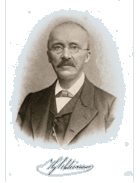Articles of incorporation of the
Heinrich-Schliemann-Gesellschaft e. V.
§ 1 Company name and headquarters
The association carries the name “Heinrich-Schliemann-Gesellschaft e.V.”. Its headquarters are at 17219 Schliemanngemeinde Ankershagen/Mecklenburg. The association is registered in the register of associations with the district court of Neubrandenburg under registration number 1652.
The Heinrich Schliemann Society is an international association of Schliemann friends, researchers and scientists.
It exclusively and directly pursues non-profit purposes according to German fiscal law.
The fiscal year is the calendar year.
§ 2 Purpose of the society
The Heinrich Schliemann Society promotes science and research, in addition to art and culture.
Furthermore, the Heinrich Schliemann Society promotes science and research and the arts and culture through the moral, material and financial support of other tax-privileged bodies of public law for the idealistic, financial and material promotion and maintenance of science and research and art and culture.
It sees its task as supporting international research on the life and works of Heinrich Schliemann and to cultivate, preserve, promote and disseminate Heinrich Schliemann's intellectual heritage at home and abroad.
The Heinrich Schliemann Society is also a promotion company of the Heinrich Schliemann Museum Ankershagen.
The purpose of the statutes is realised by:
1. Events, meetings and colloquia on Schliemann-related topics, as well as excursions and educational trips.
2. working with artists, writers and publicists to prepare exhibitions, readings and performances.
3. Care of the reference library.
4. The propagation and development of the Heinrich Schliemann Society collection (autographs, first and early prints, picture documents, memorabilia, reproductions of archaeological finds, artistic reception documents). The Heinrich Schliemann Society, in agreement with the Heinrich Schliemann Museum, can loan parts of its collection to the museum.
5. Cooperation with the Heinrich Schliemann Museum in agreement with the director of the Heinrich Schliemann Museum at exhibitions, scientific projects, library and collection matters and other local events for cultivation of the memory of Heinrich Schliemann.
6. The independent implementation of research projects, the results of which can be made available at their discretion to the Heinrich Schliemann Museum.
7. Cooperation with scientific bodies and institutions in Germany and abroad, as well as with schools and institutions committed to the name and work of Heinrich Schliemann.
8. The publication of scientific and popular scientific publications, as well as the publication of an annual information sheet for the members of society.
9. The procurement and transfer of funds via contributions, donations and events that serve the purpose of promoting the sponsored purposes. The society is non-profit making, it pursues no self-economic purposes.
§ 3 Membership
(1) Any individual, any legal person of private and public law, as well as any unincorporated association of persons, which recognises and promotes the statute and objectives of the company may become a member of the company. Individuals and associations of persons who wish to support the goals of the Heinrich Schliemann Society by means of financial or material donations can be accepted as a “supporting member”.
(2) The Executive Board decides on written applications for admission.
(3) Membership shall end
a) with the death of a member,
b) by written resignation,
c) by exclusion from the company.
Grounds of exclusion include significant violations of company interests, as well as a non-payment of contributions despite two reminders. The exclusion is to be carried out by a resolution of the executive committee. At the request of the member concerned, an opportunity to justify can be given prior to the general meeting, which may cancel the decision of the board. Anyone who is over two years in arrears of their payment contribution will cease to be a member.
§ 4 Corporate bodies of the society
The corporate bodies of the society are:
1. The General Assembly,
2. Executive Committee,
3. The Board.
§ 5 General Assembly
(1) At least once a year, the Chair of the Executive Board or their Deputy will convene a General Assembly by personal written invitation with a notice period of six weeks from the date of the postmark.
With the invitation, a member is to be informed of the agenda proposed by the board, including drafts for any decisions to amend the statutes and to hold elections.
Requests from members must be made in writing to the Chair at least two weeks prior to the meeting. Such requests should be read out to participants at the beginning of the Assembly and, if appropriate, be included in the agenda by decision.
(2) An extraordinary general meeting must be convened by the chair or their deputy if, in the opinion of the board, the interests of the company are urgently required or if one third of the registered members invite the board in writing stating the matters to be dealt with.
(3) The General Assembly has the following duties in particular:
a) Setting the agenda at the beginning of meetings,
b) Resolutions on amendments to the Articles of Association and dissolution of the Company,
c) Receipt of the Management Board’s annual report and the granting of discharge,
d) Election and dismissal of the board,
e) Choice of cash auditors (at least 3),
f) Fixing the amount of the membership fee,
g) Deciding the budget,
h) Decision to appoint honorary members.
(4) The chair or a member nominated by the board directs the general meeting. The General Assembly passes its resolutions with a simple majority of votes of the members present. Every member who has reached the age of 16 is entitled to vote. Each individual and corporate member has one vote and can only cast that one vote. Written votes in absentia are excluded. Amendments to the statutes require the approval of two-thirds of the votes cast. The General Assembly has a quorum as soon as at least five percent (5%) of its members attend. If there is no quorum, the meeting can be reconvened after a 1 ½-hour break. It is then quorate with the number of members present. This should be indicated on the invitation.
(5) A record of the resolutions of the general assembly shall be signed by the leader of the meeting, another participant of the assembly entitled to vote and the chair of the meeting.
§ 6 Executive Committee
(1) The number of members shall be determined by the General Assembly for the duration of the term of office. To run the day-to-day business, the company elects a managing board consisting of a chair, their deputy and a treasurer. The company is represented by the chairman in and out of court, and in case of the chair being unable to carry out their duties, by their deputy in this office.
(2) The General Council is usually elected by the General Assembly for a term of four years from among the members entitled to vote. The members of the executive board are elected individually to their offices. The other seats on the board will accept those candidates who achieve the highest number of votes in a final election. When one of the members of the Executive Board leaves, the member with the highest number of votes moves from the extended Executive Board. This also applies correspondingly to the departure of other board members. If the chair leaves, their deputy succeeds. From the extended board, the member with the highest number of votes moves to the executive board. Required supplementary elections will be held by the next ordinary general meeting.
(3) For the past financial year of their term, the Chair or their representative, shall report to the Annual General Meeting of office with an accountability report. The cash auditors will check the cashier's report for accuracy and mathematical accuracy. Following the presentation of the cash report previously audited by at least two of the members elected for this purpose, the treasurer and the management board are to be granted discharge for the past financial year on the recommendation of the auditor.
For negative recommendations of the cash auditors, proceed as follows: If it refers only to the treasurer, then they must be suspended from office; the cash management must be taken over by another member of the Executive Board.
The outgoing board and its individual members shall continue to be legally responsible and subject to recourse in the legal sense even after expiry of the term of office, resignation or dismissal for their actions, unless they have been granted discharge by a corresponding resolution of the general meeting.
(4) In the constituent meeting, the Management Board shall adopt a business and administrative code in which the duties and powers of the Executive Board and other members of the Executive Board are specified in more detail in nature and scope.
In accordance with these regulations and within the framework of the annual budget drawn up by the Executive Board, the Executive Board is responsible for the day-to-day work of the company. The management of the Heinrich Schliemann Museum can be consulted for this purpose. It may submit proposals to the Board for the implementation of individual measures. The acting director of the Heinrich Schliemann Museum is to be invited to all meetings of the Executive Board. If they are not a member of the board of the Heinrich-Schliemann-Gesellschaft, they will only have an advisory function.
(5) The Executive Board has a quorum if more than half of the members of the Executive Board are present. Resolutions are passed by a simple majority of votes; in case of a tie, the vote of the Chair decides.
§ 7 The Board
The Management Board may appoint individual members and persons who are interested in science and who are not members of the Heinrich Schliemann Society, at their request, by way of a resolution of the Board of Directors, as consultants or on an advisory board. The Advisory Board advises the Executive Board on all issues relating to its work and promotes society's concerns, in particular through its public impact. The appointment is made by board resolution.
The consultant or advisory board are to act publicly in relation to the general meeting, to support the board in its work, especially in factual matters, and to contribute to the scientific work of the company.
§ 8 Members’ rights
Members have the right to actively participate in the society and to participate in the implementation of the goals of the society.
§ 9 Financing and membership fees
The company is funded by membership fees, donations and income from events and sales.
(1) The amount of the annual membership fee is determined by the General Assembly. The annual membership fee has to be paid by members to the account of the company in the first quarter immediately after joining or for the current calendar year.
In justified cases, the Management Board may, in justified cases, exempt a member for a limited period of time or until further notice from payment of the fees.
Sponsoring members can contribute in cash and in kind.
(2) The society collects donations and makes donations. It seeks the support of sponsors and patrons.
§ 10 Asset management
(1) The treasurer shall administer the petty cash, make payments with instructions from the chair, or their representative, in the event they are unable to do so, and report annually through the Company's treasury at the general meeting. Every year a budget needs to be drawn up.
(2) Expenditure may be made by the treasurer together with the chair or, in event of their absence, by the deputy, up to a maximum of EUR 500.00. Further expenses are regulated by the Financial Regulations, which are part of the Business and Administrative Regulations.
(3) At least once a year, four weeks before the annual general meeting, a cash audit must take place by the cash auditors.
(4) Company funds may only be used for statutory purposes. Members receive no contributions from the Company's funds.
(5) No person may be favoured by expenses that are foreign to the purposes of the company or by disproportionately high remuneration. The offices of the associations and bodies are generally exercised voluntarily.
§ 11 Remuneration of company activities
(1) If necessary, within the scope of budgetary possibilities and taking into account tax requirements (especially according to § 3 No. 26 a ESTG) paid activities for the company on the basis of a written service contract or against the written assurance of expense allowance can be exercised.
(2) The Board of Directors shall make a decision on paid activity pursuant to subsection (1) as well as the contents of the contract and the termination of the contract by written decision. The Management Board is also authorised to commission third parties accordingly.
(3) The claim for reimbursement of expenses can only be asserted within one year after their creation. Refunds will only be granted if expenses are substantiated by supporting documents and statements that are auditable.
(4) By resolution within the scope of tax possibilities, the Executive Board may set limits on the amount of the reimbursement of expenses according to § 670 BGB.
(5) These provisions also apply to members of the Management Board insofar as they are involved in contractually regulated activities. This does not affect the work of the Board.
§ 12 Honours
Personalities who have rendered outstanding services to the efforts of the Heinrich Schliemann Society can be appointed honorary members on the proposal of the Executive Board. Likewise, the Board may appoint persons living abroad who support the research projects of the Heinrich Schliemann Museum through their correspondence as “Corresponding Members”. Neither need to pay a contribution.
Insofar as the general meeting pursuant to § 5 (3) (h) appoints members to honorary members pursuant to § 3 of the association's statutes, they shall not lose their rights under § 8 of the statutes, their voting rights or the capacity to hold a management board position.
The Heinrich Schliemann Society awards the Heinrich Schliemann Medal as the highest honour. Further details with respect to the awarding of the Heinrich Schliemann Medal are regulated by the Statutes of the General Assembly.
§ 13 Liquidation of the company
The dissolution of the company can be decided in a specially convened general meeting if it is approved by three quarters of the members present.
Upon dissolution of the company by membership decision or abolition of the company or if its tax-privileged purpose ceases to exist, the last meeting of the members specially convened shall decide on the final use of the company assets.
Existing property, such as the collections and company library should be passed to a legal person of public law or another tax-privileged body closely related to the study of antiquity and the person of Heinrich Schliemann for use in promoting science and research or arts and culture. The execution of the necessary measures is the task of the executive board according to § 26 Para. 1 BGB.
Date of Effect
These statutes come into force with the resolution via the general meeting on 09.09.2018 and the statutes of 08.09.2013 are suspended.










